 9 citations,
September 2016 in “Medical Clinics of North America”
9 citations,
September 2016 in “Medical Clinics of North America” Eating less and exercising more, with personalized diet plans and realistic goals, can lead to weight loss and better health, but more research is needed for long-term success.
11 citations,
August 2012 in “BMJ case reports” Ban Tu Wan, a Chinese herbal supplement, can cause severe liver damage.
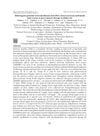 December 2020 in “Nigerian journal of animal production”
December 2020 in “Nigerian journal of animal production” Dexamethasone can cause diabetes in rats, and Annona muricata bark extract may help lower blood sugar.

Oral Minoxidil can cause serious eye problems, but stopping it can improve vision.
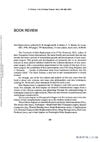 January 1997 in “Journal of Toxicology-cutaneous and Ocular Toxicology”
January 1997 in “Journal of Toxicology-cutaneous and Ocular Toxicology” The book "Hair Replacement" is a detailed guide on hair transplant and treatments, useful for surgeons and clinicians.
 5 citations,
January 2018 in “Skin appendage disorders”
5 citations,
January 2018 in “Skin appendage disorders” Minoxidil base is preferred for hair loss treatment, but minoxidil sulfate may be an alternative for unresponsive patients.
 14 citations,
January 2013 in “International Journal of Trichology”
14 citations,
January 2013 in “International Journal of Trichology” Treating hair loss requires a comprehensive approach that addresses both physical and emotional aspects, with a focus on diagnosis, patient education, and good communication.
 22 citations,
March 2018 in “American Journal of Clinical Dermatology”
22 citations,
March 2018 in “American Journal of Clinical Dermatology” New acne treatments show promise as alternatives to traditional therapies.
 20 citations,
January 2018 in “Expert opinion on emerging drugs”
20 citations,
January 2018 in “Expert opinion on emerging drugs” JAK inhibitors may soon be a safe and effective treatment for alopecia areata.
 May 2015 in “Journal of The American Academy of Dermatology”
May 2015 in “Journal of The American Academy of Dermatology” Finasteride for hair loss in young men increases the risk of sexual dysfunction.
January 2018 in “Journal of human virology & retrovirology” Lifestyle drugs are mainly used by wealthy people in India but could spread to others, affecting society and youth.
 January 2018 in “Elsevier eBooks”
January 2018 in “Elsevier eBooks” Topical imiquimod is as effective as 5-fluorouracil for treating actinic keratosis, with about a 5% risk of it turning into squamous cell carcinoma.
26 citations,
January 2018 in “Skin appendage disorders” Thallium, mercury, selenium, and colchicine strongly cause hair loss.
 June 2023 in “British journal of dermatology/British journal of dermatology, Supplement”
June 2023 in “British journal of dermatology/British journal of dermatology, Supplement” Patients with alopecia areata face challenges accessing Janus kinase inhibitors, but some see positive results.
January 2018 in “대한본초학회지(본초분과학회지)” The herbal extract SHJ promotes hair growth and increases melanin production.
 1 citations,
August 2017 in “International clinical psychopharmacology”
1 citations,
August 2017 in “International clinical psychopharmacology” Bupropion causes more hair loss than other antidepressants, with paroxetine causing the least.
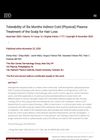 3 citations,
November 2020 in “Journal of Drugs in Dermatology”
3 citations,
November 2020 in “Journal of Drugs in Dermatology” Cold plasma treatment for hair loss was well tolerated and showed improvement in most patients.
April 2023 in “European urology open science” Urologists should screen for mental health issues before and during finasteride treatment.
October 2022 in “International Journal of Dermatology” Digital health platforms improve treatment for male pattern hair loss.
 77 citations,
June 2015 in “Nature Reviews Urology”
77 citations,
June 2015 in “Nature Reviews Urology” Some common medications can harm male fertility, but many effects can be reversed.
219 citations,
January 2006 in “Drug Metabolism Reviews” DHEA affects multiple receptors and may help with metabolic issues, but its safety and effectiveness in humans are unclear.
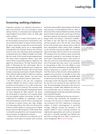 December 2006 in “Lancet Oncology”
December 2006 in “Lancet Oncology” The document concludes that better training and education are needed for proper cancer screening and criticizes the GMC's inaction as harmful to clinical ethics in the UK.
 2 citations,
May 2010 in “Actas Dermo-Sifiliográficas”
2 citations,
May 2010 in “Actas Dermo-Sifiliográficas” Home-use medical-cosmetic devices like lasers for hair removal may be convenient but need more research to confirm safety and effectiveness.
 23 citations,
April 2010 in “Clinical, cosmetic and investigational dermatology”
23 citations,
April 2010 in “Clinical, cosmetic and investigational dermatology” Bimatoprost ophthalmic solution 0.03% safely and effectively increases eyelash growth when applied to the upper eyelid.
 1 citations,
June 2018 in “International Journal of Dermatology”
1 citations,
June 2018 in “International Journal of Dermatology” DNCB is highly effective for treating alopecia areata with minimal long-term side effects.
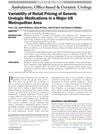 5 citations,
August 2018 in “Urology”
5 citations,
August 2018 in “Urology” Independent pharmacies generally offer lower prices for certain generic urologic medications than chain pharmacies.
 May 2015 in “Journal of The American Academy of Dermatology”
May 2015 in “Journal of The American Academy of Dermatology” Young men taking finasteride for hair loss have a higher risk of sexual dysfunction.
 49 citations,
August 2009 in “British Journal of Cancer”
49 citations,
August 2009 in “British Journal of Cancer” Finasteride might lower the risk of low-grade prostate cancer but not high-grade cancer, while alpha-blockers might reduce high-grade cancer risk.
 1 citations,
October 2023 in “Journal of the Endocrine Society”
1 citations,
October 2023 in “Journal of the Endocrine Society” HIV medication ritonavir can increase the effects of nasal sprays like fluticasone, causing Cushing's syndrome.
 5 citations,
May 2018 in “Drug Safety”
5 citations,
May 2018 in “Drug Safety” Using electronic health records can help identify drug side effects but has some limitations.























